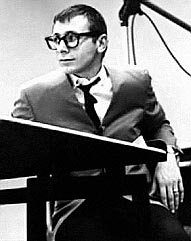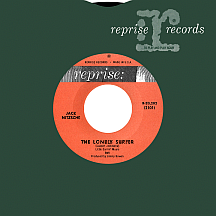JACK NITZSCHE
The Lonely Surfer
He was a behind-the-scenes guy who became a hit recording artist while remaining behind the scenes. Chicago-born Bernard Alfred Nitzsche had an uncanny knack for arranging music, his gift fortunately picked up on by industry people in position to help advance his career, among them Sonny Bono, Jimmy Bowen and Phil Spector...especially Spector, who took the bespectacled Jack Nitzsche (who'd Hollywood-ized his name a bit) shortly after the founding of his Hollywood-based Philles Records and handed him the challenge of arranging most of the "Wall of Sound" masterworks to come...for which Spector hogged most of the glory. But he did, at least, give credit where credit was due.
Jack's one hit disc under his own name is first-rate, a panoramic instrumental opus: "The Lonely Surfer." I doubt if anyone with a '60s music mindset can listen to the song and not visualize a beautifully uninhabited beach, the sun rising (or setting), a singular surfer at tide's edge, contemplating one more big wave. The record's top 40 status (it rode in for a couple of weeks in September 1963, then out again) was but one of many achievements for the former Michigan farmboy (his family moved to the small town of Newaygo when he was a child) transported by way of bus 'n' thumb to Hollywood's Westlake College of Music when he was 18. That was in 1955; within three years his formal music training started coming in handy at Specialty Records, where he worked as a music copyist, putting the various ideas bandied about by songwriters, producers and arrangers into much-needed, detailed sheet music form. You can believe some, but not all, of the stories you've heard about classic hits being ad-libbed in the final few minutes of a studio session. It's actually a rare occurrence.
This early experience helped get him in the door at other L.A. labels, notably Art Laboe's Original Sound, where he composed an instrumental ditty for Preston Epps dubbed "Bongo Bongo Bongo," which became a charting summer '60 sequel to Epps' 1959 hit "Bongo Rock." Record exec Lester Sill took notice and introduced Jack to Phil Spector, Sill's partner in their new Philles enterprise. Spector sidekick Sonny Bono also put in a good word for J.N. (the two had worked together at Specialty). Starting in mid-1962, Nitzsche masterminded the arrangements (that Phil altered anyway) of some of the greatest hits of the era...practically everything by The Crystals, Darlene Love and The Ronettes, ever-popular LP A Christmas Gift For You and some of Spector's earth-shaking 1966 recordings by Ike and Tina Turner. Nitzsche was credited as arranger on nearly every 45 label and the boss nicknamed him "Specs"...after his horn-rimmed glasses we can assume, but perhaps it was a play on Phil's name...a "Mini-Me" kind of mentor thing? Sporting shades, they both looked strikingly similar. Jack took advantage of his close proximity to the world's most famous film studios and wangled an appearance in late '62's Girls! Girls! Girls! starring Elvis Presley. Look closely at the lounge band - he's the pianist.
Nitzsche and Bono put their heads together and came up with "Needles and Pins," a hit in the spring of '63 for Jackie DeShannon (in Southern California, at least) and mega-seller for The Searchers when the Brit band remade it several months later (then the U.K.'s Barron Knights skewered the song in its novelty hit medley "Call Up the Groups," a bare-faced rip-off of the hits "More Money for You and Me" and "The Big Draft" by The Four Preps). Jack's artist contract with Reprise Records and "The Lonely Surfer," co-composed with Marty Cooper and produced by Bowen, gave 1963's summer season a closing theme. The inevitable album sported liner notes by Daddy Phil himself, singing Jack's praises as only an affable "Dr. Evil" type might do. Many of the best L.A. musicians (some have called them "The Wrecking Crew") worked on these all-instrumental mini-epics and freshly-arranged covers of hits, including guitarists Tommy Tedesco and Bill Pitman, pianists Don Randi and Leon Russell, bassists Jimmy Bond and David Gates, drummer Hal Blaine and others, and I can't leave out those French horn specialists Gale Robinson and Bill Hinshaw (pretty sure John Entwistle paid attention; parts of later Who tunes sound suspiciously, enjoyably similar to Jack's potent pop concertos).

The follow-up to "Lonely Surfer" came off as a "big noise" horn interpretation of Link Wray's "Rumble" from a half-decade back; it was Nitzsche's only other national chart single, a hard-hitting Thanksgiving blip on the radar. About a year later he nabbed the job of musical director for The T.A.M.I. Show, the much-admired stage-show-on-film time capsule staged in October '64, wherein he juggled the egos of Jan and Dean and Chuck Berry, Britain's Billy J. Kramer and Gerry Marsden, Motown's Miracles plus Marvin plus diva Diana's Supremes, the west coast's Beach Boys versus the east coast's Lesley Gore, The Barbarians and their one-armed drummer, show stealer James Brown and closing act The Rolling Stones. In fact, he did some studio work with Britain's bad boys (it hadn't taken long for them to become fans of him); on "Pain in My Heart," he was credited as playing the "Nitzsche-phone"...listen and see if you can figure out which instrument it really is. More Stones sessions took place in the coming years. Sticking with Sonny, he added his two cents to duets with newlywed wife Cher. These guys stayed busy!
He began writing scores for films, starting with Village of the Giants, a low budget sci-fi clunker based on H.G. Wells' The Food of the Gods, released in the fall of '65. Jack recycled his third single, hot rod power instro "The Last Race," into the score (the song found a larger audience 42 years later as the opening number in Quentin Tarantino's girls-get-revenge-on-Kurt Russell car chase pic Death Proof). Jack's other 45s for reprise included western movie-style songs "Zapata" and The Burnette Brothers' "Green Grass of Texas." His final '60s single was a biting alternate version of "African Waltz," the tune made popular by Cannonball Adderley. Afterwards Nitzsche records were seldom seen, but he remained a constant presence in recording studios, giving the world too many hits to accurately tally by artists lasting and fleeting. In the '70s he focused his energies on writing film scores, kicking off with Performance, a crime drama starring pal Mick Jagger.
From the Astonishing Trivial Facts file: Jack Nitzsche and acting legend Jack Nicholson were born on the exact same day, April 22, 1937. You might think there was a pretty good chance their paths would one day cross. After 38 years it happened with One Flew Over the Cuckoo's Nest, a blockbuster hit, winner of the Oscar for 1975's Best Picture, Nicholson's first victory in the Best Actor category...and Nitzsche picked up a nomination for Best Original Music Score.
While known somewhat for his troubled relationships (there were occasional brawls with on-and-off girlfriend Carrie "Mad Housewife" Snodgress), Jack found love, personally and professionally (for a decade or so), with singer-songwriter-activist Buffy Sainte-Marie. He received another nomination for Original Score and collaborated with Buffy and Will Jennings on the song "Up Where We Belong," featured prominently in the 1982 film An Officer and a Gentleman. All three won Oscars for composing the song (singers Joe Cocker and Jennifer Warnes had already taken it to number one). Jack Nitzsche had an event-filled career, but after writing the music for mid-1990s films The Crossing Guard and Blue Sky, his health took a turn for the worse. He was 63 when he passed away in 2000.


